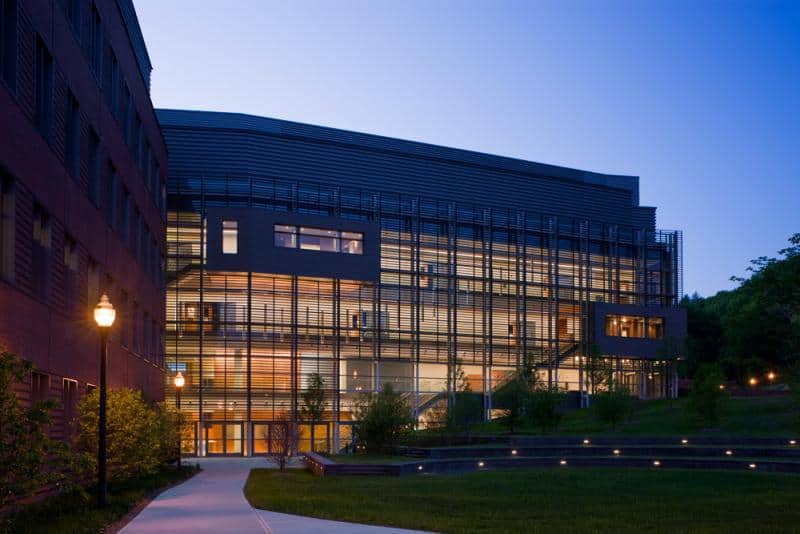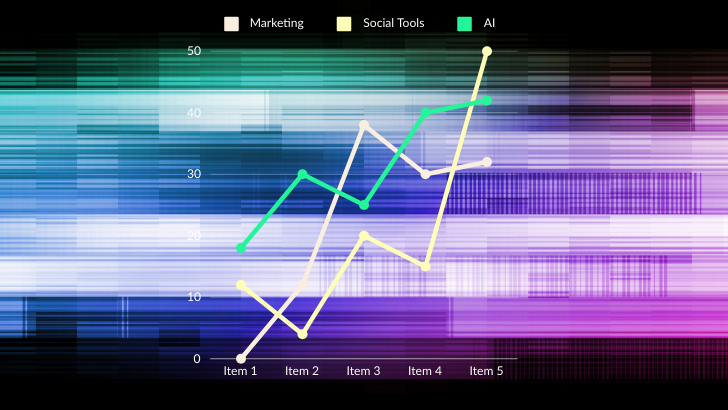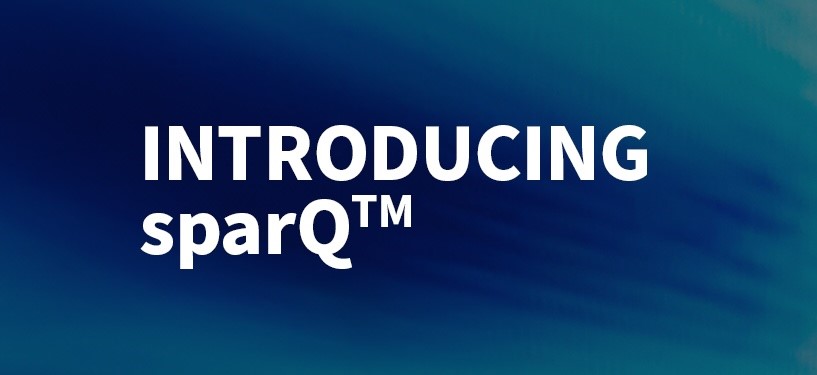Katherine Newman is the University of Massachusetts System Chancellor for Academic Programs, the Senior Vice President for Economic Development and the Torrey Little Professor of Sociology at UMass Amherst. We had the opportunity recently to talk with Professor Newman about her role, UMass’ efforts in fostering applied sciences in the state, the relationship between industry and UMass, and the importance of public universities for economic mobility. Our wide-ranging conversation follows.
________________
A Dynamic Role
Tell us about your role at UMass. Your title has multiple parts, any one of which seems like it would be a full-time job.
I think the best way to think about my role is that I am the Chief Academic Officer of the UMass system. There are five campuses of our university, and I am at the top of the food chain when it comes to academic programs and tenure. I have dotted line relationships to campus leaders ranging from the provost, student affairs, people who run the dormitories, student programs, to the whole international realm and all that we do for international education. I have very strong working relationships with the Chief Research Officers who  are responsible for tech transfer, intellectual property development, and research investment.
are responsible for tech transfer, intellectual property development, and research investment.
Added on to all of that, I was asked to take on responsibility for our economic development program, which used to be a separate division. But the president decided it should be more tightly integrated with the academic mission, so I have that portfolio as well. So yeah, it’s the kitchen sink, but it’s a very varied and interesting and dynamic kind of job. I can define the mission as I think it makes the most sense in collaboration with my colleagues.
Partnering with Industry
What does economic development mean for a university?
That’s a really good question, and it has meant different things over time. It has to do with the commercialization of our research. We bring in a lot of money from the federal government and from foundations to support the research, but we also spin-off inventions, patents, licensing revenue, and start up companies. That’s a big part of economic development.
There’s also a growing interest in developing research park-like structures around the state, and we have a number of satellite facilities that are growing up. They’re not really campuses, but adjacent areas where we have located different kinds of collaborative research groups. Near the UMass Boston campus, for example, the former Bayside property, which is now going to be developed, is going to end up being a kind of Kendall Square by Dorchester Bay. My office will try to be helpful to that campus as they try to build up the relationships between companies and the university.
Many universities have become very active in this space. They have developed all kinds of collaborative relationships. We have some very old ones in the University of Massachusetts. For example, Raytheon has been working with the Amherst campus for more than 40 years to develop its radar program, which pretty much came out of the Amherst engineering programs, and I think there are something like 400 alumni of UMass Amherst at Raytheon. The Lowell campus also has a co-located facility with Raytheon, and that has to do with their heritage in the textile industry, since there’s a lot of interest now in smart fabrics and so on, and the Lowell campus is really good at that.
My office tries to support any effort that the campuses are undertaking to create bonds 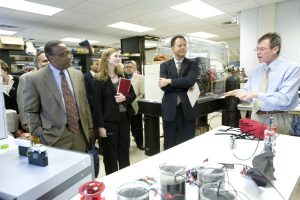 with industry. I also think that the manpower supply and the supply of skilled professionals to the Massachusetts economy is very much in the remit of the university, and so I think of economic development also as the cultivation of talent that will stay in Massachusetts. As you know, we have many distinguished private universities in Massachusetts, but their students don’t always stay here, whereas our students do tend to stay in the Commonwealth.
with industry. I also think that the manpower supply and the supply of skilled professionals to the Massachusetts economy is very much in the remit of the university, and so I think of economic development also as the cultivation of talent that will stay in Massachusetts. As you know, we have many distinguished private universities in Massachusetts, but their students don’t always stay here, whereas our students do tend to stay in the Commonwealth.
There are many different elements to economic development, and quite honestly, I think there will be more as time goes on, because I think we all recognize the university has a responsibility to develop as much in the way of revenue as it can to support our core operations.
What do you see as the role of industry?
Industry is very important in the commercialization of intellectual property because they are the ones who take these inventions and discoveries and turn them into something that can be marketed. I would say our relationship with industry is multipronged. Our medical school, for example, is extremely successful at developing diagnostics and therapeutics and, through Mass Biologics, can manufacture as well. They’re very successful at commercialization and at developing relationships with industry in the biopharma area, which is what you would imagine a medical school could do.
On the Amherst campus, The Institute for Applied Life Science was built in recent years. I hired the first director, Peter Reinhart, when I was the provost out there in 2015. The institute was built in large part with a generous grant from the Massachusetts Life Science Center, via an allocation from the state that helped to pay for 30 core facilities. Core facilities are generally very expensive instruments that are costly to acquire and costly to maintain but are really important to the scientific enterprise, and often important to businesses, including small businesses.
The state now maintains a voucher program that subsidizes industry use of those core facilities. It’s critical for small business not to have to purchase that equipment themselves but to be able to make use of that Amherst facility. Actually, across the state, we have 90 core facilities, all of which are eligible for this voucher program that the State of Massachusetts supports. This is our way both of developing the research that turns into new inventions and useful products and supporting industry, especially the industry and firms that are located near our campuses where those instruments can be very valuable. There’s a very close bond, but industry doesn’t give us a list of things they want to understand and then we just go execute on it. There’s a mutual migration in the direction of important discoveries that matter.
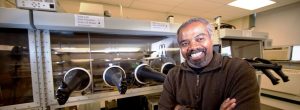 We just today are concluding the sixth Zoom summit that the five campuses of UMass mounted for industry in applied sciences. A lot of what people will learn from them was about the work that’s being done on wearable sensors. Some of our campuses do a lot of work for the military, for the Navy, down at the Dartmouth campus with undersea vehicles and remote sensing capacity. At Lowell, we are making significant advances in self-repairing fabrics, which can fix themselves on the battlefield. It’s amazing. Or sensors that can “taste” a toxic exposure without endangering a person. These are just examples of problems that we try to solve because they’re important scientific or engineering challenges, but they have tremendous application. It’s that applied science frontier where the bond with industry is probably closest.
We just today are concluding the sixth Zoom summit that the five campuses of UMass mounted for industry in applied sciences. A lot of what people will learn from them was about the work that’s being done on wearable sensors. Some of our campuses do a lot of work for the military, for the Navy, down at the Dartmouth campus with undersea vehicles and remote sensing capacity. At Lowell, we are making significant advances in self-repairing fabrics, which can fix themselves on the battlefield. It’s amazing. Or sensors that can “taste” a toxic exposure without endangering a person. These are just examples of problems that we try to solve because they’re important scientific or engineering challenges, but they have tremendous application. It’s that applied science frontier where the bond with industry is probably closest.
Do you think the bond and the importance has changed as there’s been a long- term decline in federal research dollars flowing to universities?
Yes and no. I think there have been periods in the past where the industry was much more important than it is now. If you go back to any of the war footing, that was really an important period. We are still very active in the federal research sweepstakes, and I think with the Biden administration, we’re going to see a significant uptick. The Department of Defense, the National Institutes of Health, these are huge research investors, and Massachusetts as a state and our system as a university have been beneficiaries of that investment. The Department of Energy is a huge, huge investor in technology. A lot of the work that we do on alternative energy is coming out of grants from the Department of Energy. We wouldn’t be able to do it without the federal dollars. I would say the industry investment tends to come less at the early stage and more as they acquire patents or the use of patents and licensing, fee licensing, rather than being the code generators of the of work itself.
Blending Enlightenment with Practicality
Our research at MassTLC has shown that talent is the number one reason why companies locate here and it’s also the number one constraint once they get here. As a result, we’ve started to see a lot of partnerships with industry and universities, with industry coming in and helping develop curriculum or giving input on the skills they need. How has that impacted your work? Do you see that accelerating?
Yes, I do see that accelerating, and that’s because our students, especially this generation of students who have been battered by two major recessions in their lives, are very practical. They’re thinking about their future, and they come to the university for enlightenment, to learn things that they want to learn for their own enjoyment and intellectual enrichment. But they’re thinking a lot about where they’re going to go when they graduate, and so we have a real obligation to make sure that they are able to pursue the kinds of careers that they are after. Massachusett is a knowledge economy where the kind of skills that they learn with us do set students up for a robust future.
In order to do that, I think increasingly we need to be sure that experiential education of various kinds – co-ops, internships, part-time jobs – will give our students an opportunity to get their feet wet and to be able to assemble the kinds of firm-specific skills that make them valuable from day one rather than coming de novo just with a degree and now the employer has to train them. When I was on the Boston campus, I was able to develop this into a full-fledged program (PACE, Professional Apprenticeship and Career Experience) that I’m very proud of. It is going to be a model for many others. Students have paid internships on campus for the first couple of years that give them exposure to skills that are very practically useful on the outside. We pay a lot of attention to what the next employer down the line will be looking for in terms of skills.
To get started, we had 20 industry clusters in all these different areas, in finance, in blue tech, in banking, the list is very long. Those clusters were organizations of employers who came onto the campus to talk specifically about what they were looking for in new employees, providing an opportunity for our faculty to listen to what they had to say. The faculty are very skilled researchers, but they haven’t worked on the front lines in the banking industry. They understand it as a theory, but they’re not bankers, and this way, they could hear from leaders in the Massachusetts banking industry, or in insurance, or accounting about skills they are looking for and where their industry is going. It was extremely helpful. The faculty can then go back to their corners and figure out, how do I incorporate these ideas into my classroom? And when the students finish their on-campus internships, they then graduate into external placements with those industry leaders.
Northeastern University got to this kind of model decades ago, and they’ve done a brilliant job, but it costs $70,000 a year to go to Northeastern. What’s the public university model of this kind of integrated classroom and experiential education that prepares people for the careers they’re after? That is now and will continue to be a really important question.
Do you foresee any changes in four-year universities and how they deliver the curriculum or what’s required for graduation?
There are now lots of different models that are delivered by four-year universities for students that are not in four-year university programs. Certificates sometimes can also be flavors to add to a general degree. If you have a degree in business, you might flavor that 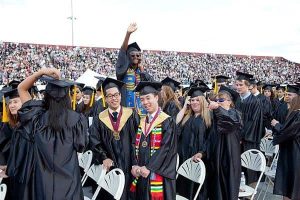 with cybersecurity; or if you had a degree in accounting, you might flavor that with forensic accounting; or nursing, you might flavor that with behavioral health and opioid addiction. These are ways to inflect a degree so that it signals an advanced concentration in a field. I think increasingly, we will see what we call 4+1 programs where students come to stay all the way through the master’s degree, and we’ll try to accomplish that in five years rather than six. Increasingly, we’re seeing a demand for students to pivot toward the specializations that master’s degrees represent in their senior year of college and almost create a package out of that. I actually believe that’s going to become a very, very common model.
with cybersecurity; or if you had a degree in accounting, you might flavor that with forensic accounting; or nursing, you might flavor that with behavioral health and opioid addiction. These are ways to inflect a degree so that it signals an advanced concentration in a field. I think increasingly, we will see what we call 4+1 programs where students come to stay all the way through the master’s degree, and we’ll try to accomplish that in five years rather than six. Increasingly, we’re seeing a demand for students to pivot toward the specializations that master’s degrees represent in their senior year of college and almost create a package out of that. I actually believe that’s going to become a very, very common model.
What we need to do is be sure that that’s as affordable as possible, and that’s why shaving off that one year really makes it more cost-effective for the student. I also think it is really important for students to be able to pursue whatever they genuinely enjoy, whatever makes them feel enlightened and enthusiastic for the first three years. Then if they have to start thinking about “where do I go now,” they can start to pivot towards something they might see as more labor market-friendly.
We developed a program on the Amherst campus in business and analytics, which had no prerequisites, you could be an art history major and pivot into business and analytics, and I think that is a really great model, because it allows students to study art history for three years without agonizing over, “Can I make a living with this degree?” Some people will and more power to them, but that kind of flexibility allows you to pick up an advanced specialization after a few years of learning for its own sake. I really value my education as a major in philosophy; it is very important to me. It still frames the way I think about almost everything that I do, but I was never going to be a professional philosopher.
The other thing I would mention is increasingly, and certainly this is true for UMass, there is a movement of the university into all kinds of additional markets for higher education – adult education, working parents, people who return to university after an absence of some period of time. These are additional markets and in Massachusetts, there are something like a million people who started their education but didn’t complete it, and we are ready to help them complete that degree. Across the country, it’s much bigger, it’s 34 million, something like that. In a state like this, the returns to education are enormous. The lifetime earnings of someone with a college degree are so much higher than someone who didn’t get the degree. This gap is, in my view, not just an economic issue, it’s a social justice issue. We have a responsibility to make sure people can make the most out of their earnings potential.
Public Universities’ Role in Promoting Economic Mobility
Massachusetts has one of the highest per capita incomes in the U.S., but we also have the greatest income inequality. What is the roles of universities, particularly state universities, in beginning to fix this?
It’s absolutely critical. We have a responsibility toward everyone in the state, which includes a large number of low-income households where education is going to dictate whether or not they can achieve a kind of economic stability and upward mobility that they seek, and this is particularly important to me because that’s my research area. I am a student of labor markets, and I’ve written a lot about the working poor. I’ve spent decades writing about them, and so I’m very well aware that most working poor people do desire to complete an education, but it’s difficult. They’re self-funding, basically, and they end up stopping and finding it difficult to come back. We need to adjust both our financial aid models and our educational technologies to make sure we can reach them, because in a state like Massachusetts, if you don’t have a college degree, the likelihood that you will ascend into the middle-class just grows more and more dim.
I wrote a book a number of years ago called “No Shame in My Game: The Working Poor in the Inner City,” and, to my surprise, the people I was studying over many years, after the age of 25, were still very likely to go back to school. They had not given up hope, they were just having to do it one class at a time, which meant it was quite costly for them, and the delay in the benefits cost them too. If it took them 15 years to finish the degree, that’s 15 years before they can lean on that degree.
I taught at Harvard for eight years, and I founded the program on Inequality and Social Policy at the Kennedy School, and the whole point of it was to focus on the policies necessary to reduce inequality. Inequality is roaring, and the pandemic has really brought this all home to us. The role of all the public universities is to try to close those gaps by providing as affordable and as accessible an education as we can. My colleagues on the campuses spend a lot of time not only thinking about how to attract students from low-income and first-generation households, but how to keep them, how to enable persistence. I was a working student myself, I worked 30 hours a week when I went, all the way through college, so I’m very well aware of how hard it is to balance, but I’m glad I persisted. We need to figure out how we help everyone do so as well.
The Future is Coming Soon, Get Ready
Is there anything else that you want the tech community to know?
We’re now rounding the corner out of this COVID crisis, and when we do, the question is going to be how the labor market will reconfigure itself in the wake of a great deal of automation. The industries of the future are going to be born in Massachusetts, and that’s why we did these projects on applied science, because I think that’s where our real strength lies, and it’s where the jobs are going to go. Our responsibility here is to tighten that bond with industry to be sure they know what we’re working on and we know what problems they’re trying to solve and that we prepare our students so that they can be that labor market supply of the future. Because we’re going to come out of this thing, and the labor market is not going to look the way that it did before. It never does after a recession. To me, the big message is that we need to all get organized for the future because the future is around the corner.
